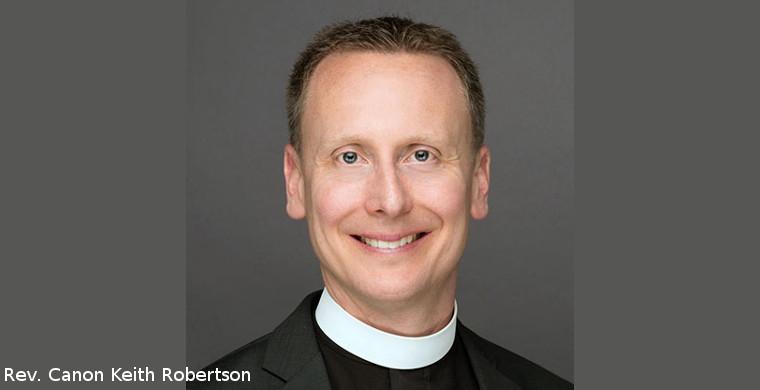CANADA: Diocese of Toronto elects partnered homosexual bishop
By David W. Virtue DD
www.virtureonline.org
Sept. 19, 2016
The Diocese of Toronto has elected three new suffragan bishops, one of whom is the Rev. Canon Kevin Robertson, "the first openly gay, partnered bishop-elect in the diocese and perhaps in the Canadian church", said a diocesan press release.
Bishop-elect Robertson was elected on the fourth ballot of the second election. He is 45 and the incumbent of Christ Church, Deer Park, in Toronto. After earning his Master of Divinity from Trinity College in 1997, he was ordained deacon the same year and priest in 1998. He and his partner Mohan have two children.
"I'm very overwhelmed," he said on the chancel steps after the elections. "I didn't really expect to be standing here on the steps, but I'm deeply, deeply honored. I realize this is an historic day in the life of our church. It's no secret that I'm the first openly gay, partnered bishop-elect in the diocese and perhaps in the Canadian church as well, and I know that for some people that's a real challenge and for others it's the fulfillment of what they've been hoping and praying for a very long time. The peace and unity of the church is really important to me and I will work to continue that peace and unity as a bishop."
Bishop-elect Robertson said his election is a turning point for the church in accepting and supporting LGBTQ people. "I think General Synod (in July) was a turning point for the national church and my election today is a turning point for our diocese, and I'm honored to be a part of that. I'm really encouraged by the developments over the past couple of months -- both General Synod and today bode really well for the full inclusion of LGBTQ people in the life of our church."
He said he will be a bishop for the whole church. "I think LGBTQ clergy and lay people might naturally gravitate towards me looking for some leadership around the issue of full inclusion, but I absolutely see myself as a bishop for the whole church, including people who have a very different view of things than I do. I'm their bishop, too."
Before the first election began, the Rev. Dr. Catherine Sider Hamilton issued an official protest against the inclusion of “one candidate whose lifestyle is, to the best of my knowledge, irregular according to the teaching of the church regarding chastity and marriage. It is a teaching that still stands formally, and I believe that the inclusion of this candidate by the nominations committee is premature.” Archbishop Johnson replied that all the nominees were clergy under license in the diocese and in good standing. Synod proceeded with all the nominees on the ballot.
Considering the state of the Anglican Church of Canada, it was inevitable, as it is not really a Christian denomination any more.
He said he is passionate about renewing ministry at the parish level. "I hope I can help to renew the life of the church at the local level, and as a result strengthen and enhance the whole church. One of the things I want to do is really engage with clergy and lay leaders, including churchwardens, to reinvigorate things."
The ACoC began its historic slide into ecclesiastical sexual oblivion in 2002, when it became "passionate" as one Canadian diocese, the Diocese of New Westminster, authorized a rite for the blessing of same-sex unions at its 2002 Diocesan Synod. The use of the rite by individual parishes was incumbent upon a specific request of the parish made through its annual vestry meeting or resolution of its parochial church council. This was heartily pushed and endorsed by New Westminster Bishop, Michael Ingham.
By May 2003, six of the diocese's 76 parishes received authorization to use the rite. On May 28, 2003, the first same-sex union sanctioned by the Diocese of New Westminster occurred in Vancouver, in the church basement of St. Margaret's Cedar Cottage Church. Bishop Michael Ingham said of the rite, "This is not a marriage ceremony, but a blessing of permanent and faithful commitments between persons of the same sex." Since then, ten other dioceses (Edmonton, Nova Scotia and Prince Edward Island, Winnipeg-based Rupert's Land, Ottawa, Toronto, London-based Huron, Quebec, Hamilton-based Niagara, Montreal and Victoria-based British Columbia) have followed suit. The Anglican Parishes of the Central Interior (formerly the Kamloops-based Diocese of Cariboo and now known as the Territory of the People, also permit such rites.
This action by the diocese of Toronto will be viewed by the Global South as yet another betrayal of the Windsor Report and Lambeth resolution 1:10. It will confirm to their minds that the West is lost and, when some 36 Global South archbishops gather in Cairo next month to discuss the state and future of the Anglican Communion, it will be seen as a further tearing of the fabric of the Communion from which there is no way back.
David W. Virtue DD is the president of VIRTUEONLINE, www.virtueonline.org VOL is the Publication of Origin for this work. Permission to republish is freely granted with credit and a link back to VOL.














